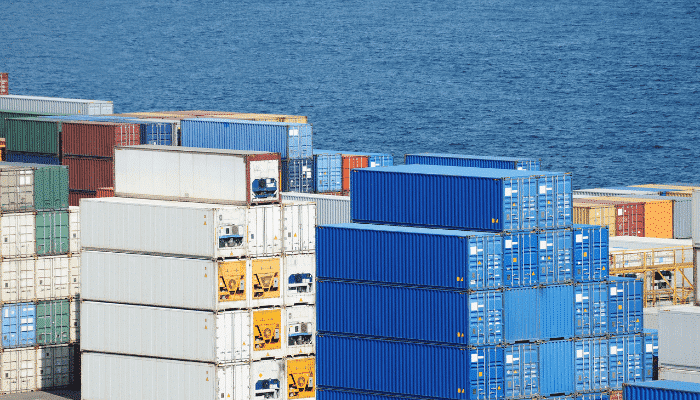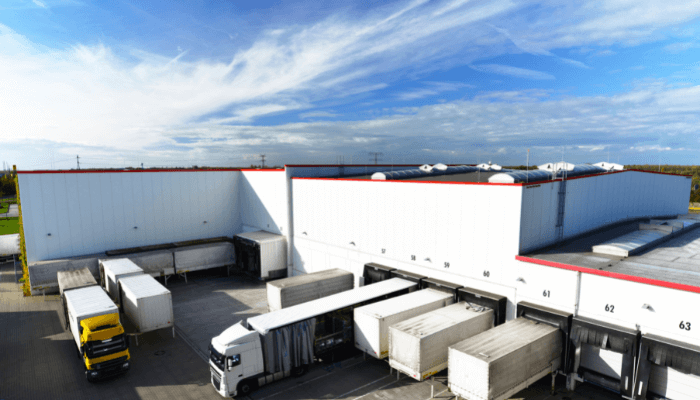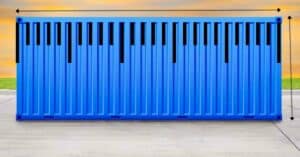What are Bonded Goods in Shipping?
Import of goods to a country normally involves payment of its customs duty, taxes, or any other charges to the government at the time of import. However, in some special cases, goods are allowed to be imported without payment of customs duties and other charges upfront.
These goods are then stored in special warehouses and either cleared or re-exported at a later point in time, on a need-basis, after payment of the necessary customs duties and taxes. Such a warehouse where goods are stored temporarily prior to the payment of customs duties and taxes due on them is called a bonded warehouse.
Customs duty and taxes are levied only on that portion of the goods that are either cleared or re-exported. A bonded warehouse is a secure warehouse that comes under the purview and supervision of national customs.
Goods that are stored in such a warehouse are known as bonded goods. Bonded warehouses are meant only for the storage of imported goods on which customs duties and taxes have not been paid.

Governments usually allow the import of raw materials for manufacturing or reprocessing, without payment of customs duty. Such bonded goods are stored in a bonded warehouse and customs duty and taxes due on them are deferred.
Once the manufacturing or reprocessing is completed and it is time for the importer to move the finished goods to the domestic market, the importer has to pay all customs duties and taxes on the finished goods to the government at the time of clearance.
Another scenario is when goods in bonded storage are processed further to enhance their value and readied for re-export. Bonded goods such as these do not enter the country. When such goods are re-exported, the importer does not have to pay customs duties or taxes.
In certain cases, goods such as those for humanitarian aid, etc. may be exempt from customs duties and taxes completely.
Customs Warehouse
A bonded warehouse is sometimes known as a customs warehouse. Most countries allow the storage of bonded goods in a bonded warehouse for an indefinite period. However, in some countries, bonded goods are subject to a warehousing period of 5 years beyond which they cannot be stored as bonded goods.
Before the expiry of this period, they have to be either cleared or re-exported. When the bonded goods are not disposed of within this period, it is usually confiscated and auctioned by the bonded warehouse owner under customs supervision.
Bonded warehouses are most commonly used for the storage of items with high customs duties such as alcoholic spirits, cigarettes, etc. However, as we have seen earlier in this article, they are also used to house goods temporarily for the purpose of reprocessing or re-working and subsequent clearance or re-export.

Origin of Bonded Warehouses
Bonded warehouses had their origin in England around the latter half of 1800. Before bonded warehouses came to be in operation, customs duty had to be paid by an importer at the time of import of goods.
The other option available to him was to furnish a bond or guarantee for payment of the duty amount at a later point in time. Both these methods often meant tying up large sums of money towards payment of customs duty.
What are the Types of Bonded Warehouses Available Today?
Public Customs Bonded Warehouse
Typically, Public Customs Bonded Warehouses are government-owned and controlled by the government. Such warehouses are available to the public for the temporary storage of their goods until payment of customs duties and taxes. In some countries, private parties are also authorized by the government to run such warehouses.
Private Customs Bonded Warehouse
As the name suggests, these are privately-owned bonded warehouses that function under the supervision of the customs. The owner may store his goods or those belonging to other licensed importers in such warehouses.
The responsibility of the running, upkeep and security of the warehouse rests with the private owner. Goods coming in and going out of the warehouse are strictly monitored and recorded by the customs for payment of duties and taxes. The bonded goods that are re-exported are similarly accounted for.
Special Economic Zones
Also known as a Free Zone or a Bonded Logistics Area, these are secure geographical locations that house several logistics facilities, warehouses, processing centers, and associated businesses belonging to various organizations.
Usually located close to seaports or airports, they offer a dynamic duty-free base for companies to operate from. Several leading organizations have their offices inside such special economic zones.
Examples of highly successful special economic zones are the JAFZA (Jebel Ali Free Zone) in Dubai, UAE, the SEZs of India, China, etc.

Documents Required for Bonded Storage of Goods
Most of the countries have gone digital when it comes to operating within a special economic zone or a bonded area. Hence, the procedure of bonded warehousing is easy to comply with. Some of the common digital documents that are required in bonded warehousing are the following:
- Bill of Entry
- Transport document such as the Bill of Lading
- Transfer request form from bonded warehouse
- Bill of Export
- Shipping Bill
Advantages of Bonded Warehouses
A bonded warehouse allows for the long-term storage of imported goods without having to pay customs duties and taxes on them. This allows for bulk purchases by importers when the price is favorable. Bulk purchases help to develop the relationship between the buyer and the seller.
The importer does not have to invest in a large sum of money for the immediate payment of customs duties and other charges to the government at the time of import. He pays these only when goods are either cleared to the domestic market or re-exported.
Bonded warehouses are ideal for the storage of restricted goods. Examples are alcoholic spirits, cigarettes, etc.
Bonded warehouses are convenient for re-export as they are generally located near points of entry or exit of a country such as airports or seaports.
Such warehouses are secure and the mode of operation is easy as it is digital.
Disadvantages
Advantages far outweigh the disadvantages in storing goods bonded.
Certain formalities and documentation have to be followed for the storage of bonded goods in bonded warehouses.
While bonded warehouses are ideal for the planned storage and use of imported goods, they may be cumbersome when it comes to an emergency clearance.
You might also like to read:
- What Is A Cargo Manifest In Shipping?
- What is OOG or Out of Gauge Cargo?
- Guide To Types of Warehouses for Shipping
- What is Inbound and Outbound Logistics?
- Understanding the SOC or Shipper-Owned Container
Disclaimer: The authors’ views expressed in this article do not necessarily reflect the views of Marine Insight. Data and charts, if used, in the article have been sourced from available information and have not been authenticated by any statutory authority. The author and Marine Insight do not claim it to be accurate nor accept any responsibility for the same. The views constitute only the opinions and do not constitute any guidelines or recommendations on any course of action to be followed by the reader.
Do you have info to share with us ? Suggest a correction

About Author
Hari Menon is a Freelance writer with close to 20 years of professional experience in Logistics, Warehousing, Supply chain, and Contracts administration. An avid fitness freak, and bibliophile, he loves travelling too.
Latest Maritime law Articles You Would Like:
Latest News
- What is the Purpose of DG Shipping?
- What are Logistics Risks?
- How Port and Terminal Operators Can Control Emissions?
- Minimum Quantity Commitment (MQC) and Liquidated Damages in Container Shipping: Concept and Relevance
- MARPOL (The International Convention for Prevention of Marine Pollution For Ships): The Ultimate Guide
- The Ultimate Shipping Container Dimensions Guide
Subscribe To Our Newsletters
By subscribing, you agree to our Privacy Policy and may receive occasional deal communications; you can unsubscribe anytime.















